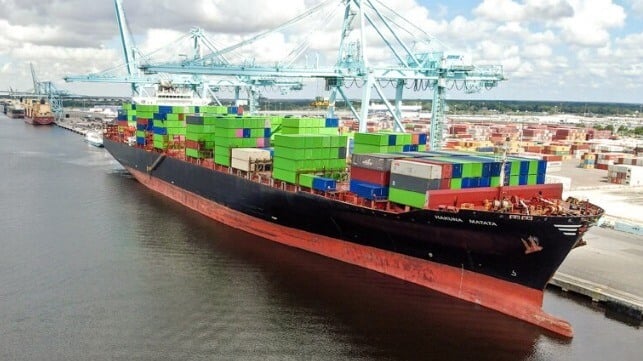Sanctions Impact Expands from Tankers to Containerships

The recent efforts by the European Union and the UK to target more tankers linked to Russia’s oil trade and the United States’ large sanctions action this week against an Iranian trading network are beginning to impact across the shipping industry. As the efforts are now reaching beyond tankers to also include containerships, analysts expect the sanctions will continue to reshape shipping.
Tankers were the first target of the sanction packages, and reports that individual ships have been idled became common as the sanctions grew. However, the impact seems to be growing as the U.S. and now the EU have begun to go after refineries and products refined from Russian oil. Donald Trump has said he would target more buyers of Russian oil if his deadline for a Ukrainian ceasefire is not met.
The United States, already this year as part of its “maximum pressure” campaign against Iran, sanctioned several smaller Chinese so-called “teapot” refineries, and in July, the EU, in its efforts to clamp down on the Russian oil trade, closed loopholes on refined products. It specifically listed the Indian refiner Nayara Energy due to its investments from the Russian oil giant Rosneft.
After a report by Reuters on July 31 that India’s state refineries were suspending imports of Russian oil due to fears over the sanctions, at least four tankers are reported now to be idling off India, according to Bloomberg’s tracking. The report highlights that more than a third of India’s oil comes from Russia, and the vessels holding offshore all appear to have loaded in late June from Russia’s terminals in Primorsk and Ust-Luga.
Three other tankers inbound toward India, which were included in the U.S.’s widened net of sanctions against Iran, are also reported to be diverting, according to an exclusive report from Reuters. The ships are carrying Russian oil and were listed by the U.S. as part of the network run by Iranian Mohammad Hossein Shamkhani, the son of Ali Shamkhani, a top political advisor to the Supreme Leader of Iran, and a former commander of the Islamic Revolutionary Guard Corps Navy.
The U.S. sanctions, however, did not stop at tankers as it listed more than 50 vessels, including 22 containerships that it said were also used by Hossein’s network also carrying cargo both to and from Iran, among other locations. The containerships the U.S. Treasury asserts are using similar obfuscation tactics to the tankers, including turning off automatic identification system (AIS) transponders and misrepresenting cargo information in bills of lading.
One of the companies snared with the inclusion of containerships in the sanction regimes is Singapore-based SeaLead, an emerging carrier with a charter fleet of vessels. The company issued a statement on July 31 saying it had been made aware that multiple vessels, chartered by the company for commercial purposes, had been added to the U.S. sanctions list.
“SeaLead confirms the termination of all charterparties and contracts related to the sanctioned vessels and entities. The company maintains full compliance with applicable sanctions laws and regulatory requirements,” it writes in the statement.
A total of 16 vessels listed by the U.S. are linked to SeaLead, which reports say could represent as much as a third of the company’s fleet. The company, in previous statements, says it operates over 55 vessels with a total capacity of just over 200,000 TEU. SeaLead says that this places it in 13th place in Alphaliner’s league of carriers.
Concurrent with the listing of the containerships, the U.S. Department of the Treasury's Office of Foreign Assets Control (OFAC) issued a “General License” which authorizes limited safety and environmental transactions and the offloading of cargo involving certain persons or vessels blocked on July 30. The 22 containerships, including the 16 linked to SeaLead, have till midnight on October 1 to offload cargo that was already aboard except at ports in Iran or Russia. They, however, are also barred from entering into new commercial contracts.
